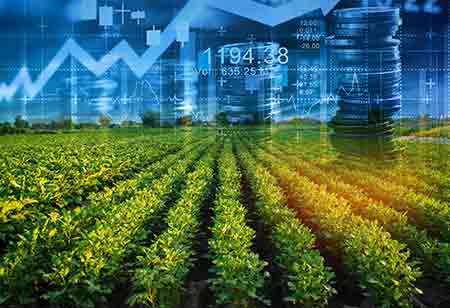

Thank you for Subscribing to Agri Business Review Weekly Brief

Stakeholders across the agricultural value chain can build a more resilient, inclusive, and prosperous future for the sector.
Agricultural finance plays a crucial role in supporting the growth and sustainability of the agricultural sector, facilitating investment in technology, infrastructure, and production inputs. As agriculture continues to evolve in response to changing market dynamics, environmental challenges, and technological advancements, trends in agricultural finance are also evolving. Digitalization is revolutionizing agricultural finance, making financial services more accessible, efficient, and tailored to farmers' needs. Fintech solutions, such as mobile banking, digital lending platforms, and blockchain-based transactions, enable farmers to access credit, manage risk, and conduct financial transactions more easily.
There is a growing recognition of the importance of sustainable agriculture in addressing environmental challenges, ensuring food security, and mitigating climate change. Impact investors increasingly direct capital towards agricultural projects and enterprises, prioritizing environmental and social sustainability. Sustainable finance initiatives, such as green bonds, sustainable agriculture loans, and impact investing funds, incentivize farmers to adopt regenerative practices, conserve natural resources, and reduce greenhouse gas emissions. By aligning financial incentives with sustainable outcomes, agricultural finance can drive positive environmental and social impact while generating financial returns for investors.
Climate change, market volatility, and natural disasters pose significant risks to agricultural livelihoods and investments. Risk management tools, such as weather-indexed insurance, parametric insurance, and revenue protection schemes, help farmers mitigate the financial impact of adverse events and safeguard their livelihoods. Innovative insurance products, such as microinsurance and index-based livestock insurance, expand access to risk management solutions for smallholder farmers most vulnerable to climate-related shocks. Risk management and insurance play a critical role in agricultural finance by promoting resilience and stability in agricultural production.
Supply chain finance mechanisms, such as warehouse receipt financing, contract farming arrangements, and digitization platforms, improve farmers' access to credit and market opportunities. By providing funding against stored agricultural commodities or linking farmers directly to buyers and markets, supply chain finance helps farmers manage cash flow, reduce post-harvest losses, and capture value along the agricultural value chain. Partnerships between financial institutions, agribusinesses, and technology providers facilitate market linkages, enabling farmers to access inputs, services, and markets more efficiently.
Government policies and incentives significantly shape agricultural finance trends, influence investment flows, and promote financial inclusion in the farm sector. Supportive policies, such as agricultural credit guarantees, interest rate subsidies, and tax incentives for agribusiness investment, encourage financial institutions to lend to farmers and agribusinesses. Public-private partnerships and government-backed agricultural financing programs, such as rural development funds and insurance schemes, promote sustainable agricultural development and economic resilience in rural communities.
